|
The
Centre for Global Logistics and Manufacturing Strategies (GLAMS) at
the Indian School of Business (ISB), hosted its flagship event of
the year - the
Global
Supply Chain Summit
- during September 6 - 7, 2007. The theme of the Summit
being, Strategies for Global
Competitive Advantage in Services, it explored the
challenges and opportunities in rural as well as global supply
chains in emerging markets like India.
The Summit consisted of two events – a Conference and a
Workshop on
Radio Frequency Identification (RFID) - systems and
applications.
Several leading industrialists, academicians, and policy makers
participated as session anchors and speakers at the Summit
Conference Highlights – Taking India to the Next Level
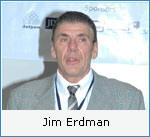 The
Inaugural Session of the Summit saw two interesting key note
addresses. The first was by Jim Erdman from Penske Asia. Erdman gave
an overview of Penske’s primary business lines and its focus on
assets optimisation. "There are plenty of capacities in the logistic
business. And if managed well, they can add a lot more value to this
industry. So it is important to manage the capacities available,
rather than bring in new capacities," said Erdman. He listed some of
the challenges of logistics and the importance of value proposition.
"There is a need for a robust back-end process to deliver reliable
and relevant services, "he added. The
Inaugural Session of the Summit saw two interesting key note
addresses. The first was by Jim Erdman from Penske Asia. Erdman gave
an overview of Penske’s primary business lines and its focus on
assets optimisation. "There are plenty of capacities in the logistic
business. And if managed well, they can add a lot more value to this
industry. So it is important to manage the capacities available,
rather than bring in new capacities," said Erdman. He listed some of
the challenges of logistics and the importance of value proposition.
"There is a need for a robust back-end process to deliver reliable
and relevant services, "he added.
The second keynote speaker of the evening was Roopa Purushothaman
representing Future Capital Research. She discussed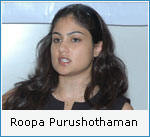 her recently published paper 'Is Urban Growth Good for Rural India?'
and came up with startling finds. "Using an econometric approach, we
found that a Rs.100 rise in urban consumption, could lead to an
increase in rural household incomes of up to Rs. 39," she said.
Purushothaman described the three urban myths about contemporary
rural India - "that faster economic growth in urban India vis-à-vis
rural India is driving rapid urbanisation, that rural India is still
an agricultural economy, and that rural-urban inequality in India is
on the rise." She noted that urban demand is actually a largely
over-looked engine, which can help drive a crucial shift from farm
to non-farm employment in rural India. Purushothaman concluded that
rural and urban economies in India are "more integrated than
traditionally acknowledged,"
her recently published paper 'Is Urban Growth Good for Rural India?'
and came up with startling finds. "Using an econometric approach, we
found that a Rs.100 rise in urban consumption, could lead to an
increase in rural household incomes of up to Rs. 39," she said.
Purushothaman described the three urban myths about contemporary
rural India - "that faster economic growth in urban India vis-à-vis
rural India is driving rapid urbanisation, that rural India is still
an agricultural economy, and that rural-urban inequality in India is
on the rise." She noted that urban demand is actually a largely
over-looked engine, which can help drive a crucial shift from farm
to non-farm employment in rural India. Purushothaman concluded that
rural and urban economies in India are "more integrated than
traditionally acknowledged,"  and
is actually converging since around year 2000. and
is actually converging since around year 2000.
The themes of
the other sessions of the summit were India specific and hence
relevant and had lots of interesting take-aways for the
participants. The sessions were titled -
Indian
Retail- Scripting and Evolution, Manufacturing Renaissance in India,
Indian Service Sector- A Rising Force in Global Economy, and
Charting the Strategic Growth of Indian Logistics Sector.
Among a host of renowned industry speakers was, Anshuman Singh,
Future Logistics Solutions Ltd. who made a presentation on
Vertical Integration in Retail
Industry: Benefits and Woes. "Integration in supply
chain in retail is important as it is closely related to consumer
logistics," explained Singh.
Another speaker
was Colin Lian, SAP ASIA Pte Ltd, who spoke on
Information Systems for Retail
and the Scope of e-Retailing. "Understand, anticipate
and inspire," this was the mantra of Lian to help India evolve to
the next stage of retail, which is creating life-style destinations.
Lian disclosed that according to an AT Kearney survey India is
placed number one in "market attractiveness", followed by Russia and
China. He projected that over the next 5 years, organised retail
will witness a phenomenal growth and that the new consumer will be
"goal oriented." About e-retailing, Lian had a few tips, "Choose the
right model, know what works online for you, be mindful of channel
conflicts, keep to your promise, know your ATP, and last have supply
chain visibility."
Peter Holloran, Dow presented a talk on
Integrated Global Supply Chain
Network: Dow's Perspective and stressed on the linkage
between supply chain and strategy and the importance of information
flow. Ravi Kallayil from Nike gave an address on
Nike's Supply Chain Strategy in
India while Kumar Ashish, ICICI gave a gist of
Innovations in Rural
Financing.
Each of the sessions was followed by a panel discussion where
industry and academia joined best of perspectives about the road
ahead for Supply Chain issues.

Workshop
Highlights – the Science and Art of Retail Performance
 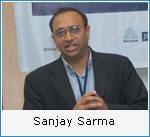 “What
if all the conference attendees had badges and there was a reader at
the entrance – it could be used for, maybe, fire safety,” said
Professor Sanjay Sarma, Associate Professor, MIT, during a workshop
he conducted on Radio Frequency Identification (RFID) systems and
applications. Professor N Viswanadham, Executive Director GLAMS,
introduced Professor Sarma as “the architect of the RIFD lab at MIT
– not only an academic researcher but also a mentor to several
industrial activities.” Professor Sarma is one of the founders of
the Auto-ID Center at MIT, which developed many of the technical
concepts and standards of retail RFID. His current research projects
are in the areas of radio frequency identification, IC packaging,
manufacturing, CAD/CAM, machine design, RFID applications, device
networking and smart devices. “What
if all the conference attendees had badges and there was a reader at
the entrance – it could be used for, maybe, fire safety,” said
Professor Sanjay Sarma, Associate Professor, MIT, during a workshop
he conducted on Radio Frequency Identification (RFID) systems and
applications. Professor N Viswanadham, Executive Director GLAMS,
introduced Professor Sarma as “the architect of the RIFD lab at MIT
– not only an academic researcher but also a mentor to several
industrial activities.” Professor Sarma is one of the founders of
the Auto-ID Center at MIT, which developed many of the technical
concepts and standards of retail RFID. His current research projects
are in the areas of radio frequency identification, IC packaging,
manufacturing, CAD/CAM, machine design, RFID applications, device
networking and smart devices.
Professor Sarma
was accompanied by Dr Ravikant Pappu, cofounder of ThingMagic, a
leading provider of high- performance performance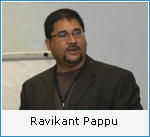 RFID readers and modules. Dr Pappu is a PhD holder from MIT.
RFID readers and modules. Dr Pappu is a PhD holder from MIT.
RFID is a
method of remotely storing and retrieving data using devices called
RFID tags - a small object, such as an adhesive sticker, that can be
attached to or incorporated into a product which enables them to
receive and respond to radio-frequency queries from an RFID
transceiver. The data transmitted by the tag may provide
identification or location information, or specifics about the
product tagged, such as price, colour, date of purchase, etc. RFID
systems can be used just about anywhere, from clothing tags to
defence departments, to pet tags to book stores. Today RFID is being
touted as the next leap in the science and art of retail performance
– global retail giant Wal Mart is taking the big lead in adopting
this “intelligent” technology. In India too it is making inroads in
the areas of pharma, airlines, retail, logistics, etc.
The workshop addressed the concept of RFID to the participants, and
how it will impact the supply chain as well as other industries.
Professor Sarma also provided pointers to leverage RFID in one’s
company.
The workshop
comprised 4 sessions:
-
Technology:
The What and How of RFID
-
Retail
Supply Chain: From Manufacturing Lines to Shopping Baskets
-
Suppliers:
What is a Brand Worth?
-
Asset
Tracking and Other Opportunities
“Think of RFID
uses in the most mundane ways and then see how it can affect your
business, “said Professor Sarma. He further explained that while it
is true that supply chains are not very efficient, it is not yet
confirmed whether RFID will solve the conflict because it depends on
factors like “how people adopt it and how technology issues and
business issues are addressed.”
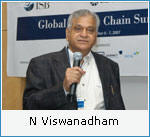 GLAMS,
since inception, has endeavoured to undertake research projects in
the areas of logistics, manufacturing, and supply chain management
as relevant to emerging economies. The Centre disseminates the
research to the partners by organising such conferences. "The
Summit’s agenda was to take the retail, manufacturing, and business
service industries to the next level of competitiveness in the
global arena," said Professor N Viswanadham, Executive Director
GLAMS, summing up the core objective. GLAMS,
since inception, has endeavoured to undertake research projects in
the areas of logistics, manufacturing, and supply chain management
as relevant to emerging economies. The Centre disseminates the
research to the partners by organising such conferences. "The
Summit’s agenda was to take the retail, manufacturing, and business
service industries to the next level of competitiveness in the
global arena," said Professor N Viswanadham, Executive Director
GLAMS, summing up the core objective.

Contributions are invited for the November 2007 issue of Alma Matters. Please
send in information on any events that have taken place or are being planned in
your chapter as well as personal milestones that you would like to share with
the ISB alumni community to
Smita_Hopper@isb.eduedu |
